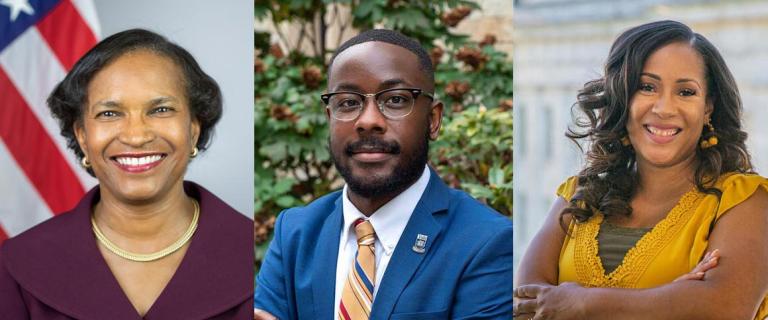

Issues of environmental justice are deep-rooted. And it is not just disproportionate exposures to environmental threats, access to clean energy, or inequities in food systems that draw concern; it is also the individuals in places of power who make critical environmental decisions — in government, in business, and in environmental organizations —who are under increasing scrutiny.
This is the focus of ongoing research from Dr. Dorceta Taylor, senior associate dean of diversity, equity, and inclusion and professor of environmental justice at the Yale School of the Environment, who shared some of her work during an opening address at the recent New Horizons in Conservation Conference, a global conversation on justice, diversity, equity, and inclusion hosted by YSE.
Taylor noted that CEOs of environmental nonprofits are overwhelmingly white and male, earning high levels of compensation. She predicts that, in the next five years, the issue of equal compensation will emerge as a key driver of conversations on equity in environmental organizations.
“There is so much work to be done,” said Taylor, the founder of the conference.
More than 800 people from 24 countries attended this year’s three-day virtual conference, which is sponsored by YSE’s Justice, Equity, Diversity, and Sustainability Initiative (JEDSI). Panels, plenary sessions and workshops focused on topics that included: media coverage of environmental issues; environmental reparations; food insecurity; climate justice; energy development and energy justice; environmental hazards and disaster responses; incarceration and environmental inequalities; and career and professional development.
“The conference is becoming increasingly important as we witness the severe impacts of climate change on both humans and ecosystems, increasing losses of biological diversity worldwide and the growth of authoritarianism worldwide, and even in our own country that reduces the role of citizens influencing both the state of our environment and of humanity. We need to advance environmental leadership and all kinds of leadership for our collective future,” said YSE Dean Indy Burke in her welcoming remarks.
A panel discussion, “Women Leaders in Conservation Organizations,” advanced Taylor’s idea of inequity of environmental organizations. Ebony Martin, co-executive director of Greenpeace, looked closely at her own organization, saying that while progress is being made on diversifying its staff, the international nonprofit must ensure that individuals from underrepresented groups are set up for success and empowered to make changes.
“You have to shift the entire culture of the organization,” said Martin, Greenpeace’s first Black executive director. “We are so much stronger, sharper. and smarter as an organization because we are more diverse.”
The panel also included Frances Beinecke BA ’71, MFS ’74, former president of the Natural Resources Defense Council, and Tamara Toles O’Laughlin, president and chief executive officer of Environmental Grantmakers Association.
Beinecke said diversifying leadership in environmental organizations and staff is emerging as a front-and-center issue that must be handled with intentionality. “There is so much that has to be done and we won’t succeed without a much broader tent,” she told the audience.
During a plenary session on climate and extreme weather, the discussion focused on who directs climate policy on the government level and how to influence those policymakers. Michael Mendez, assistant professor at the University of California, Irvine, and a former Pinchot Faculty Fellow at YSE, explained the situation of migrant communities, who are disproportionately vulnerable to environmental threats yet often left out of important decision-making.
“Current disaster policies render many migrant and minority communities invisible,” said Mendez. “And these communities, particularly migrant communities, have been living with this disproportionate injustice for many years.”
Brenda Mallory, chair of the White House Council on Environmental Quality, took part in a plenary session on environmental quality and oversight, highlighting new federal efforts to address issues of environmental justice. She shared her optimism in President Biden’s plan to release billions of dollars to combat climate change, invest in clean energy, and provide better housing, but understands that the true benefits won’t be seen unless those most at risk are prioritized.
“I’m excited for the money to start flowing,” said Mallory, “but we need to be certain that funding is reaching the people who need it the most.”
The New Horizons conference also serves as a platform for emerging environmental leaders who are historically underrepresented in the environmental field and/or committed to diversity, equity, and inclusion in the field. Attendees may participate in a poster session to present their research and/or professional work. This year’s winners were Angelica Chavez-Duckworth and Diamond Spratling, who developed the “Greenlink Equity Map,” an online tool designed to help cities visualize equity-related issues and how burdens are spread across neighborhoods.
Photo Caption: Speakers and moderators at the 2022 New Horizons in Conservation Conference included (from left) Brenda Mallory, chair of the White House Council on Environmental Quality; Cameron Humphrey '21 MEM philanthropy fellow; and University of California, Berkeley Haas School of Business; Ebony Martin, co-executive director of Greenpeace.